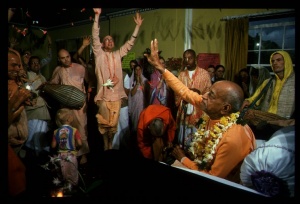CC Adi 11.7 (1975): Difference between revisions
(Vanibot #0027: CCMirror - Mirror CC's 1996 edition to form a basis for 1975) |
(Vanibot #0020: VersionCompareLinker - added a link to the Version Compare feature) |
||
| Line 2: | Line 2: | ||
<div style="float:left">'''[[Sri Caitanya-caritamrta (1975)|Śrī Caitanya-caritāmṛta (1975)]] - [[CC Adi (1975)|Ādi-līlā]] - [[CC Adi 11 (1975)|Chapter 11: The Expansions of Lord Nityānanda]]'''</div> | <div style="float:left">'''[[Sri Caitanya-caritamrta (1975)|Śrī Caitanya-caritāmṛta (1975)]] - [[CC Adi (1975)|Ādi-līlā]] - [[CC Adi 11 (1975)|Chapter 11: The Expansions of Lord Nityānanda]]'''</div> | ||
<div style="float:right">[[File:Go-previous.png|link=CC Adi 11.6 (1975)|Ādi-līlā 11.6]] '''[[CC Adi 11.6 (1975)|Ādi-līlā 11.6]] - [[CC Adi 11.8 (1975)|Ādi-līlā 11.8]]''' [[File:Go-next.png|link=CC Adi 11.8 (1975)|Ādi-līlā 11.8]]</div> | <div style="float:right">[[File:Go-previous.png|link=CC Adi 11.6 (1975)|Ādi-līlā 11.6]] '''[[CC Adi 11.6 (1975)|Ādi-līlā 11.6]] - [[CC Adi 11.8 (1975)|Ādi-līlā 11.8]]''' [[File:Go-next.png|link=CC Adi 11.8 (1975)|Ādi-līlā 11.8]]</div> | ||
{{CompareVersions|CC|Adi 11.7|CC 1975|CC 1996}} | |||
{{RandomImage}} | {{RandomImage}} | ||
==== TEXT 7 ==== | ==== TEXT 7 ==== | ||
Latest revision as of 14:38, 26 January 2020

A.C. Bhaktivedanta Swami Prabhupada
TEXT 7
- asaṅkhya ananta gaṇa ke karu gaṇana
- āpanā śodhite kahi mukhya mukhya jana
SYNONYMS
asaṅkhya—innumerable; ananta—unlimited; gaṇa—devotees; ke—who; karu—can; gaṇana—count; āpanā—the self; śodhite—to purify; kahi—I speak; mukhya mukhya—only the chief; jana—persons.
TRANSLATION
These branches and subbranches of devotees are innumerable and unlimited. Who could count them? For my personal purification I shall try to enumerate only the most prominent among them.
PURPORT
One should not write books or essays on transcendental subject matter for material name, fame or profit. Transcendental literature must be written under the direction of a superior authority because it is not meant for material purposes. If one tries to write under superior authority, he becomes purified. All Kṛṣṇa conscious activities should be undertaken for personal purification (āpanā śodhite), not for material gain.